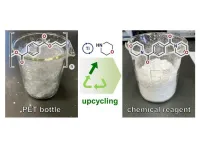Type of work: Peer-reviewed / experimental study / people
Up to a third of mothers don’t bond well with their babies after birth, causing intense emotional distress to both mother and baby1. Now researchers have found that they can train at-risk expectant mothers to recognise and regulate emotions better, potentially reducing their risk of postpartum depression.
Presenting the work at the ECNP Congress in Barcelona, researcher Dr Anne Bjertrup said:
People generally have an automatic tendency to see the positive or negative in any situation. In previous studies we saw that certain expectant mothers tended to perceive mostly negative emotions in relation to babies. This took several forms. In some cases the expectant mother would look at babies and mistakenly think that they were distressed or unhappy, when in fact they weren’t. In other cases where the baby was distressed, they were emotionally unable to deal with this. So we had to see if we could train them, to help them avoid this negative bias and their own reaction during motherhood”.
The work has just been published in the peer-reviewed journal Neuroscience Applied2.
The proof-of-concept study included 45 expectant mothers from hospitals in Copenhagen. 23 of them were at high risk of postpartum depression and potentially not bonding with their child, having suffered from earlier depression. The remaining 22 had no depression history and were classified as having a low risk3. All were assessed at the beginning of the study to see how they responded to various “baby emotions”. The women at high-risk then underwent a series of computer-based training sessions aimed at helping them cope with difficult emotions, and after two weeks they were reassessed.
Anne Bjertrup (of the Psychiatric Centre Copenhagen- NEAD Centre, Copenhagen, Denmark) said, “With the at-risk women we were trying to communicate different things. For example, to make the worried expectant mothers focus on how a baby really expressed itself not just what she thought she saw, and then to respond appropriately. We tried to make sure that the women could accurately recognise the emotion a baby was showing, and we got them to visualise how to properly respond to these emotions”.
After the training, women in the high-risk group were significantly better at recognising happy babies; the women were themselves able to show more happy facial expressions, and reacted less to signs of infant distress.
Dr Bjertrup Continued:
“We found that participants' perceptions of infant facial expressions shifted significantly after the training. For example, before the training, they viewed ambiguous baby facial expressions as slightly negative. After the training, this perception became positive, marking a 5% shift towards a positive perception on our rating scale. Importantly, those who showed the most improvement in recognizing happy baby expressions had fewer indications of depression six months post-childbirth. Those who improved the most in recognizing happy baby expressions had fewer signs of depression six months after giving birth.
This means that if we can train expecting mothers to be more sensitive to happy expressions and give them back control over their emotional reaction toward baby distress, it might reduce the risk of postpartum depression. This not only benefits the mother but also contributes to a healthier emotional development for the baby”.
She added “This is a preliminary study, so we need to interpret these results cautiously. We are currently undertaking a bigger trial, which will include a control group. Nevertheless, these initial results are promising. We’re amongst the first groups anywhere to really explore how we can use emotional cognitive processes to prevent this significant mental illness and mother-infant bonding problem”.
In the EU alone, there are around 4 million births every year, meaning that well over a million mothers and babies will be having bonding problems. Not bonding can have serious impacts on, mother and child, and families. Children may find it difficult to develop secure attachments in later life, although this also depends on what happens in early life. A mother may find it difficult to bond for various reasons, such as hormonal changes, stress, or past traumas. This can lead to a sense of shame or inadequacy, with many mothers refusing to acknowledge their difficulties. Many respond by emotionally closing down, creating a vicious cycle of alienation.
Dr Bjertrup added “It's important to recognize that bonding challenges, outside of PostPartum Depression or other mental illnesses, can stem from various factors. Not experiencing immediate bonding feelings as one might expect doesn't inherently signal an issue. A mother might not have immediate bonding feelings yet can still respond sensitively and appropriately to her infant's emotions and cues”.
Commenting, Dr Mijke Lambregtse - van den Berg, Infant Mental Health Specialist at Erasmus Medical Center, Rotterdam, said: “Postpartum depression is a serious condition, not only affecting the mother, but also her child. This promising study not only stresses the importance of early mother-child bonding, it also trains expectant mothers at risk in how to better recognise positive emotions in babies. Reinforcing a positive mother-baby interaction might ultimately prevent postpartum depression as well.”
This is an independent comment, Dr Lambregtse - van den Berg was not directly involved in this study.
Notes
This work is presented at the 36th ECNP Congress, which takes place in Barcelona and online 7-10 October 2023, see https://www.ecnp.eu/Congress2023/ECNPcongress. With more than 6,000 participants the ECNP Congress is Europe’s leading platform for the latest research in disease-related neuroscience.
https://www.theguardian.com/lifeandstyle/2016/jun/06/one-third-of-new-mothers-struggle-to-bond-with-their-baby-research-shows
Neuroscience Applied, Prenatal affective cognitive training: A proof-of-concept study, Bjertrup et al (2023). None of the comments in the press release appear in the paper. https://www.sciencedirect.com/science/article/pii/S2772408523001175
The low-risk group did not receive any training. They were tested at the end of the trial and showed no change.
END
Teaching expectant mothers to bond with their babies
2023-10-09
(Press-News.org)
ELSE PRESS RELEASES FROM THIS DATE:
Young children who are close to their parents are more likely to grow up kind, helpful and ‘prosocial’
2023-10-09
A loving bond between parents and their children early in life significantly increases the child’s tendency to be ‘prosocial’, and act with kindness and empathy towards others, research indicates.
The University of Cambridge study used data from more than 10,000 people born between 2000 and 2002 to understand the long-term interplay between our early relationships with our parents, prosociality and mental health. It is one of the first studies to look at how these characteristics interact over a long period spanning childhood and adolescence.
The researchers ...
The hidden scars: Stigmatization a major impact of skin diseases across Europe
2023-10-09
(Lugano, Monday, 9 October 2023) A major pan-European study has revealed that almost all patients affected by skin diseases face embarrassment, with the psychological burden compounding the physical impact of living with the disease.1,2
The Burden of Skin Disease in Europe, published today in the Journal of the European Academy of Dermatology and Venereology (JEADV), analysed 19,015 individuals with a range of skin diseases and revealed the huge psychological toll of living with a disease. The diseases examined included, amongst others, fungal skin infections, acne, atopic dermatitis (eczema), alopecia, psoriasis and sexually transmitted diseases (STDs).
With high levels of stigmatisation, ...
Discovery of invisible nutrient discharge on Great Barrier Reef raises concerns
2023-10-08
Scientists using natural tracers off Queensland’s coast have discovered the source of previously unquantified nitrogen and phosphorous having a profound environmental impact on the Great Barrier Reef.
The findings, published today in Environmental Science and Technology, indicate current efforts to preserve and restore the health of the Reef may require a new perspective.
Southern Cross University’s Dr Douglas Tait leads the ground-breaking study, ‘Submarine groundwater discharge exceeds river inputs as a source of nutrients to the Great Barrier Reef’.
Submarine ...
Scientists upcycle polyesters through new waste-free, scalable process
2023-10-07
Tokyo, Japan – Researchers from Tokyo Metropolitan University have developed a new chemical process which upcycles polyesters, including PET in plastic bottles, to morpholine amide, a versatile and valuable building block for synthesizing a vast range of compounds. The reaction is high yield, waste-free, does not require harmful chemicals, and is easily scalable. The team successfully break the often costly closed-loop recycling loop of plastic waste, allowing upcycling to more valuable products.
Recycling plays an indispensable part of our fight against plastic waste. But at what ...
Tufts University president Sunil Kumar aims to spread the light beyond the hill
2023-10-07
Under overcast skies that stood no chance of clouding the celebratory tone of the day, hundreds of faculty, staff, students, alumni, neighbors, and academic leaders gathered today on the Medford/Somerville campus to witness the inauguration of Sunil Kumar as the 14th president of Tufts University. He succeeds Anthony P. Monaco, who served as president for 12 years.
Delegates from more than 85 academic institutions and learned societies around the world attended Kumar’s inauguration ceremony on the residential quad. The ceremony ...
Antidepressants versus running for depression: is there a winner?
2023-10-07
Type of work: peer-reviewed/experimental study/people
The first study to compare effects of antidepressants with running exercises for anxiety, depression and overall health shows that they have about the same benefits for mental health – but a 16-week course of running over the same period scores higher in terms of physical health improvement, whereas antidepressants lead to a slightly worse physical condition, as has been suggested by previous studies. However, the drop-out rate was much higher in the group which initially ...
Wearable bracelet tracks bipolar mood swings: changing electrical signals in skin linked to manic or depressed moods
2023-10-07
Not peer-reviewed/experimental study/people
Researchers have announced preliminary results of using wearable technology to measure electrical impulses in the skin and other physiological biomarkers which might be associated with mood changes in bipolar disorder. The work is at an early stage, but they hope that they will be able to build on these patterns to detect mood swings in bipolar disorder sufferers, so helping in diagnosis and potentially offering more rapid and personalized treatments.
Bipolar disorder (formerly called manic-depressive illness or manic depression) is a mental illness that causes swings in a ...
SUSTAIN Center at UH commemorates five years of combatting AIDS/HIV epidemic in Southern U.S.
2023-10-07
The SUSTAIN Wellbeing COMPASS Coordinating Center of the University of Houston Graduate College of Social Work has made a lasting impact in the fight against the HIV epidemic in the Southern U.S. over the past five years, particularly for Black and Latinx-led organizations. The SUSTAIN Center is one of four across the South funded by the Gilead COMPASS Initiative®, an unprecedented 10-year, more than $100 million effort to address the Southern HIV epidemic by collaborating with local community organizations and stakeholders to use evidence-based solutions to meet the needs of people living with and impacted by HIV/AIDS.
Led ...
English faculty, grad students lead initiative to develop open access writing curriculum
2023-10-07
Long before another school year started for K-12 students across Texas, a Texas A&M University-led team has been hard at work behind the scenes to position high school students throughout the Lone Star state for future college writing success.
Leading the college-readiness charge is Dr. Terri Pantuso, an instructional associate professor in the Department of English and associate dean for assessment and curricular matters in the College of Arts and Sciences, who recently received a $1.2 million service contract from the Texas Higher Education Coordinating Board (THECB) aimed at better ...
The currency of conservation
2023-10-06
Governments, nonprofit organizations, and other groups spend roughly $100 billion a year to support conservation. Restrictions on where conservation funds can be spent, however, prevent organizations from focusing on the most promising opportunities to help species. A new study led by researchers at the University of Tennessee, Knoxville, suggests a way to improve the situation.
“There are plenty of conservation bargains still available in the United States,” said Paul Armsworth, professor in the UT Department of Ecology and Evolutionary Biology and lead author of the study. “Some ...






